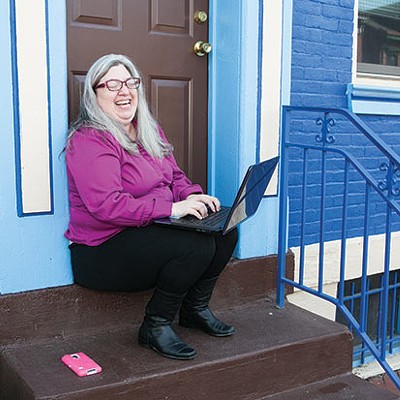At 5:40 a.m. on a frigid Sunday in April, a passenger van pulls into the parking garage at Carnegie Mellon University and out steps Kevin Amos. He’s wearing a backpack full of jazz CDs; accompanying him from Observatory Hill are granddaughters Nykeah, 10, and Promis, 8. In the darkness — the girls clutching iPads and two boxes of doughnuts — they walk to the school’s sprawling, still-slumbering university center and take the elevator to the basement.
The studios at CMU’s WRCT 88.3 FM are empty, on overnight autopilot; the PA blasts indie rock. Amos unpacks the CDs and mounts a stool at the control board. At 6 a.m., the squalling electric guitars yield to the piano-and-sax swing of The Yellowjackets’ “When the Lady Dances.” It’s track one of Amos’ six-hour shift — a spot he’s held down at free-form, volunteer-run RCT for more than three decades. In an era of broadcast conglomerates and niche-marketed playlists, he’s among Pittsburgh’s longest-serving radio DJs and perhaps its most eclectic.
These days, Amos’ Sunday services encompass two three-hour shows: Jazz Corner and One to One/H Dread. By 9 a.m., Jazz Corner will have ranged from the Yellowjackets’ smooth sounds to jittery new rock/funk from Esperanza Spalding, and from Duke Ellington’s “Swingin’ on the Campus” to Maysa’s polished contemporary R&B. Every few songs, the soft-spoken Amos chats on-air about the artists and the tunes. No satellite feed here: Amos arrived without a playlist, picks tracks on the fly and frequently departs the booth to mine discs from RCT’s well-thumbed record library.
One to One/H Dread is reggae-themed, but also ranges wide: Véronneau’s Jazz Samba Project, dancehall artist Gappy Ranks, Ben Harper & The Innocent Criminals. It all satisfies Amos’ on-air catch phrase “great black music from the ancient to the future”: blues, gospel, classic bebop, avant-garde work. And with both Top 40 to Pandora promising you more of what you’ve just heard, Amos’ palette is startlingly diverse.
“A lot of people would stick to one genre of music or one time period or one particular rhythm or beat. But in a good kind of way, he’s all over the place,” says Larry Berger, a longtime friend of Amos’ who hosts WRCT’s long-running The Saturday Light Brigade.
Amos considers himself a musical educator. “Being able to share information with the community is very important to me,” he says. But he’s happy to entertain. “I make people late for church and stuff,” he quips.
Amos, 61, grew up in Homewood. In the early ’70s he joined a scruffy, fledgling volunteer-run radio station called WYEP. He ended up on-air, later serving as program director and station manager until YEP cleaned house in the mid-’80s. Since then, among other gigs, Amos has been a producer on commercial radio, a program coordinator for Citiparks, and communications director for peace-and-justice nonprofit the Thomas Merton Center; currently, he’s a full-time student in ethnic-diversity studies at CCAC.
But his Sunday-morning show’s been a constant. While RCT is relatively low-wattage, Amos estimates he gets “at least a thousand listeners live” each week, and many more online. (Cue on-air shout-outs to Washington, D.C., and Florida.) Loyal listeners include veteran local TV and radio host Chris Moore, who loves how the ever-curious Amos has introduced him to talents like 1990s zydeco innovator Beau Jocques. Amos is “not mainstream. But he’s good, he’s rich and he’s deep into music,” says Moore. “If I owned a radio station, I might hire him to program it.”
Off-air, Amos’ educational mission includes Each One Teach One, a free day-long music, technology and radio conference with presentations from musicians, arts advocates, media representatives and more. The fourth EOTO is Sat., April 23, in Garfield.
“Kevin is incredible,” says Berger. “He’s always focused on the community. He’s innovative. He’s fought the good fight.”
Amos is a popular emcee at local jazz events; longtime journalist and public-relations specialist Tene Croom says Amos engrosses guests with his encyclopedic knowledge of the musicians.
Amos takes music education seriously. “Most people don’t know about the music because you don’t hear it on the radio most of the time,” he says. For instance, he contends, if you’re talking the history of rock ’n’ roll, “You gotta talk about Ike Turner and his days at Sun Records” and the influence of black artists on Elvis Presley.
“He’s a person who is very good at helping to set the context for the conversation,” says longtime friend Bob Davis, co-founder of online black-music resource Soul Patrol. For example, where some listeners might pigeonhole the blues as a product of Jim Crow, Amos discovers both that music’s intersections with hip hop and the African roots that bind the genres — where Ice Cube meets Muddy Waters. “Kevin is good at connecting those things together that on the surface might not appear to be connected together.”
“For somebody who’s pretty laid-back on the air, his energy level at constantly seeking out new stuff and presenting it interwoven with the old stuff is amazing,” says Berger. “A lot of people get worn down. He never stops paying attention.”



















